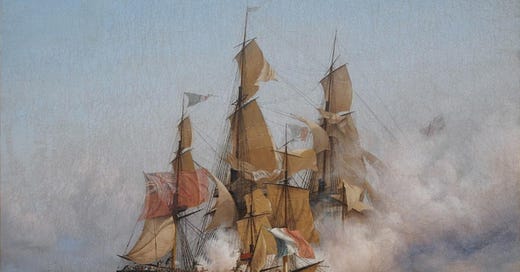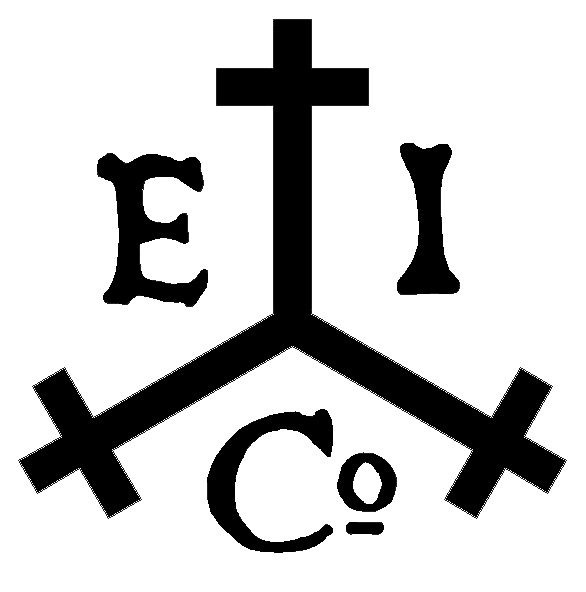Crisis Update: Pirates, Privateers And Merchant Adventurers
Second of a series on depopulation
The first multinational corporation was the East India Company
It also pursued the first public private partnership
We witness a reversion to mercantilism, to the privateer, to the skull and bones
As the original ‘evil corporation’ the EIC needed a justification, a legend
It hired Thomas Malthus, a Utilitarian and scourge of the poor…
Whose theories underpinned the logic of empire
America was built on the search for resources; the spur of empire and trade
So why the induced collapse of productive economies and the end of growth?
The Great Reset is the reversion of wealth from labour to the looting of resources
Depopulation series:
“Follow The Consensus To Your Demise — First of a series on depopulation” (Moneycircus, Aug 9, 2023)
“Pirates, Privateers And Merchant Adventurers — Second of a series on depopulation”(Moneycircus, Aug 15, 2023 )
“Hawaii Islanders Hit With New Normal — Third in a series on depopulation” (Moneycircus, Aug 16, 2023)
“Maui Land Grab Explains The Great Reset — Fourth in a series on depopulation” (Moneycircus, Aug 17, 2023)
“Indigenous People Under Attack By Globalists, From Hawaii to Australia, Fifth in a series on depopulation” (Moneycircus, Aug 17, 2023)
“Maui’s Children, Smart Cities And Sex Trafficking — Sixth in a series on depopulation” (Moneycircus, Aug 25, 2023)
(About 2,100 words or 10 minutes of your company.)
Aug 15, 2023
Writers on the topic of globalist machination often use the metaphor of the octopus or spiders’ web to illustrate the interconnections and strands of a story which we could approach from multiple directions.
Moneycircus instead follows a photographic analogy. You can recognise patterns when you stand in one place — but move your location and you have a different perspective: different objects seem to align; to be closer or farther away. Turn the rings of the lens, aperture or focus, and you can bring into clarity one item and throw another into blur, making it seem more distant than it is.
This analogy is an accurate descriptive of historical perspective. It is not history, which seeks to recount past events, but the use of history to sharpen our view of the present.
For more on historical perspective see “The Objectives Of 9/11 And The Covid Response” (Moneycircus, Sep 11, 2022)
For part two on depopulation we could take several paths: Darwinism and the eugenics movement that it spawned; theories of social hygiene and efforts to re-engineer society; empire and its justifications for exploitation; the recent history of totalitarianism, still within many people’s lived experience.
It would take a compendium of an article to enumerate them and this is not a weight-lifting contest.
We began last week on a personal note: some thoughts about how is it that society confronts one of the most heinous crimes in all of human history, without many people seeming to notice.
If you have not read it: “Follow The Consensus To Your Demise - First of a series on depopulation” (Moneycircus, Aug 9, 2023)
We have previously explored the coincidence that Bill Gates’ biggest initiative before “the decade of vaccines” was Common Core — widely derided as dumbing down American schools.
See “The Kidnapping Of Mind, Body & Soul” (Moneycircus, Jun 27, 2022)
That in turn paved the way for schooling to become largely ideological: teaching children what, not how, to think, and politics of “education” that dominates the media.
See “Whose Agenda Is The Woke Agenda?” (Moneycircus, Mar 17, 2023)
Such topics are off-putting, antagonistic, well-worn and dry. Moneycircus seeks to entertain and inform: part two begins with a journey, 400 years ago, to the East.
History and the horror
Depopulation is not simply an evil plot by people with too much time and money on their hands, perhaps gripped by an inverted envy, rubbing their hands in an ecstasy of schadenfreude.
The billionaires, themselves, are tools, captured by money — material out of balance with the spiritual, leading to a dead end of symbols and ritual.
This has been an ongoing struggle since people ventured beyond the village and encountered a different tribe. For we have one rule for our own, and the other is fair game.
This conflict is nowhere more evident in human history than in usury, empire and slavery — both human trafficking and the capture of the wage slave.
These activities raise a mirror to the face of the populace. We are confront our nature, truth or force of circumstance, and we are quick to spin narratives to justify our behaviour. ‘Twas ever thus.
Thomas, who failed to doubt
Of all the justifications for depopulation — the harm that humans, perhaps a million years old, are causing to a planet that has survived four thousand times longer — none is more persistent and alluring to the powers-that-be than the Malthusian.
Thomas Malthus first formulated his theories at the East India Company College in Hertfordshire, England. His courses would later evolve into those taught at Oxford University as politics, philosophy and economics (PPE) — which is the basic diploma for anyone serving the corporate state in the fields of bureaucracy or politics.
Malthus opposed relief for the poor and, while they were starving, supported restricting grain imports, that raised costs for the British public but which Malthus insisted would promote domestic production. In 1845-52 during the Irish famine, prime minister Sir Robert Peel resigned to join the Whigs in order to repeal the Corn Laws, a shift towards free trade that the owner-investors behind the EIC did not favour.
The East India privateers
The East India Company’s full name was the "Governor and Company of Merchants of London Trading into the East-Indies," which was granted its charter in 1600, and was owned by the City of London’s controlling families.
It was headquartered on what is now the Lloyds of London offices on Leadenhall street, next to the Royal African Company (est 1660), which historians estimate shipped more African slaves to the Americas during the Atlantic slave trade than any other company.
A vicar, Thomas Malthus, in the service of merchant adventurers and slavers, a corporation of the bankers of the City of London, developed a justification for the latter’s activities and was a founding-appointee to the East India Company College.
If anyone cannot see that the rationale is created to justify the intent… … …
Rules-based international order
We have seen that the rules-based international order is a misnomer. It means the opposite: the absence of universal rules and instead the pursuit of resources by a globalist kleptocracy that controls the making of international rules.
This is no longer nowadays an Anglo-American Establishment for there are more numerous and just as wealthy cohorts such as the Chinese. This misrepresentation, of the ruling Western elite, is not accidental since it is mainly purveyed through the Western press which is owned by five corporations in the hands of the same establishment.
These rules are presented to the public as Sustainable Development Goals which are by definition restrictive and attainable only by the richest countries, just as only the biggest companies can afford to comply with Environmental and Social Governance. That is simply a mechanism to corner the market.
See Moneycircus, Sep 8, 2022 – Opinion: Not Enough Minerals For Green Energy
The concept of one world governance, of lockstep and nations acting to one plan, in a “whole of society approach,” coordinated by the World Health Organisation, is nothing less than a Trojan horse for a would-be elite sitting atop an empire-turned-inwards, cannibalising ts own population.
Though politicians to this day speak of “free trade” their actions betray the opposite. They are appropriating the Whigs’ terminology in a 200 year-old battle with The East India Company, which was a forerunner of the contest of trading blocs of today.
The construction of the European Commission (EC) aka the European Union (EU), and the North American Free Trade Agreement (NAFTA) are the modern equivalent of carving the world into privately-controlled territories or blocs.
One among the various Asian and Latin American blocs will eventually take their place alongside -- will Asia be represented by BRICS, ASEAN or APEC? Will Latin America ally to the BRICS or Mercosur. Will Arabia join the BRICS or remain in the GCC, and will the rest of Africa join South Africa in the BRICS or use ECOWAS?
Mercantilism: flag of convenience
Controlling and regulating trade, in order to profit monopolies, is as old as the hills. The founder of Standard Oil, John D. Rockefeller once professed, “competition is a sin.” The Rockefeller interest is central to the creation of the United Nations and intergovernmental institutions as a way to regulate trade, and now resources and now humans, too.
Keep reading with a 7-day free trial
Subscribe to Moneycircus to keep reading this post and get 7 days of free access to the full post archives.




